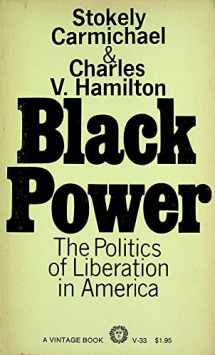
Black Power: The Politics of Liberation in America
Book details
Summary
Description
This book presents a political framework and ideology which represents the last reasonable opportunity for this society to work out its racial problems short of prolonged destructive guerrilla warfare. That such violent warfare may be unavoidable is not herein denied. But if there is the slightest chance to avoid it, the politics of Black Power as described in this book is seen as the only viable Hope. The above represents an effort by the authors to place the arguments of "Black Power: The Politics of Liberation in America" in the context of the ghetto riots of last summer. It is also a restatement of the basic assumption that underlies this book and the Black Power argument as well. Messrs. Carmichael and Hamilton argue that American Negroes can no longer afford to believe that their "liberation" will come through traditional political processes. They assert that American racism makes existing political attitudes and institutions irrelevant; that the poverty and powerlessness of this country's black population make it imperative that Negroes organize their own political organisms to make the demands and produce the kind of reevaluation of ideas and institutions to produce the needed social change. To do this, they say, Black Power will have to be understood in terms of its historical roots, its relation to the recent experiences of the Civil Rights movement in electoral and legislative politics, the economics of race relations, and the dynamics of ghetto life. That this book argues a revolutionary position is clear. It is also clear that there is a good deal to be learned here by black and white Americans. No one can disagree with the view that understanding of the meaning and implications of Black Power as a political program can contribute to racial progress. In a time of terrible crisis in our country this book is an essential part of the dialogue that must take place between Negroes and whites of all persuasions.


We would LOVE it if you could help us and other readers by reviewing the book
Book review



